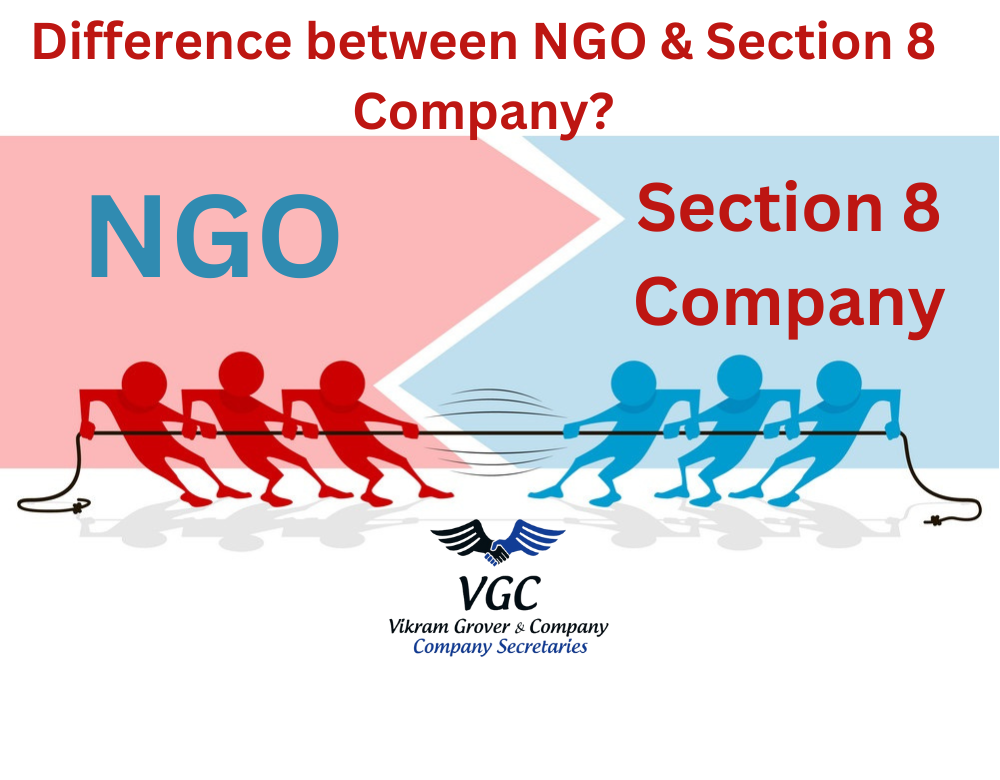
Difference between NGO & Section 8 Company?
Are you searching about what is the difference between NGO and Section 8 company? As a result, some major differences make each one better suited to specific businesses need and their business goals, making choosing between them difficult. The difference between NGO and Section 8 Company can be hard to understand at first. This article will help you to understand and compare the two organizations so you can make an wise decision on which one to hire when it comes time to take your idea and make it real.
Initially, comparison between NGOs and Section 8 companies might be quite challenging. They provide housing assistance to those who are in need, but they have different features and work with client’s interaction is different. before choosing which one is best for your family Here’s what you should be aware about the difference between an NGO and a Section 8 company.
What is a Section 8 Company?
A company in India, also known as a not-for-profit company is considered to be a Section 8 company if it is registered as per the Companies Act of 2013. Main objects of the companies that are created for the purpose of promoting trade, art, science, religion, charity or any other objectives that are similar to these are sometimes referred to as “not-for-profit” companies. These companies fall under this category. The main objective of creation of section 8 company is to promote charitable or social causes, and it is not permitted to distribute its profits to its members.
One of the main features of a Section 8 company is that it functions as separate legal entity, which is distinct from its members and person who created it. This means that it has its own identity, assets, and obligations. This indicates that the corporation is able to enter into contracts, bring or defend legal actions, and hold property in its own name. One of the other key features of a Section 8 company is that it is exempt from paying taxes on its income, subject to certain conditions. Apart from income tax act regulation here section 8 company also need to comply with corporate tax and its compliances. In addition, the company is obligated to keep accurate records and to file annual returns, all of which contribute to increased openness and accountability towards the company’s stakeholders.
In comparison to to other kinds of non-profit organisations, a Section 8 corporation has the advantage of providing greater responsibility and transparency to its stakeholders.
In addition to above, the origination having the feature of a company under companies act, 2013, so company need to follow the requirement as per act, like section 8 company must have minimum of two directors and a minimum of two shareholders, with no upper limit on the number of shareholders with other features like unique name, registered office address in INDIA, memorandum of articles and article of association as per companies act, 2013 rules and regulations.
As we discussed above that section 8 company having the feature of private limited or limited company, so in addition, the organisation is obligated to maintain proper books of accounts and to file annual returns with the registrar of companies, all of which contribute to increased openness and accountability towards the company’s stakeholders.
What is an NGO?
AN NGO, or Non-Governmental Organizations, are operates independently. Non-profit entities that concentrate on social, economic, or political issues. They differ from government organisations in that they operate independently and are not controlled by the government. NGOs can come in various forms, such as charities, advocacy groups, development organisations, and research institutes. They are usually funded by donations that are not connected to the government, like corporations, foundations, or individual donors.
NGOs are typically established as trusts and societies. and are governed by a board of trustees or a managing committee. In comparison to section 8 company Non-governmental organisations (NGOs) can be established for any lawful reason. NGOs have a significant impact in several areas, including human rights, conflict resolution, environmental protection, and development. They offer essential services to communities, promote policies for the benefit of those in need, and serve as monitors, holding governments and corporations accountable for their actions. Their independence and non-profit status enable them to operate transparently and effectively, working to ensure good governance.
Difference Between an NGO & Section 8 Company?
In below table we will better understand what are the differences between NGOs and section 8 Companies:
|
BASIS
|
Section 8 Company
|
Non-Government Organisation
|
|
Statute/ Legislation
|
A section 8 company is registered as a limited company under Section 8 of Companies Act 2013 and holds the lincense from central government.
|
The Societies Registration Act of 1860 regulates NGOs.
Trust governed by the Indian Trust Act, 1882
|
|
Definition
|
It is a company established with the purpose has in its objects the promotion of commerce, art, science, sports, education, research, social welfare, religion, charity, protection of environment or any such other object.
|
An NGO refers to a non-a governmental organization that has been formed by the individual residents but operated by the government for the benefit of the society.
|
|
Ownership
|
Section 8 Companies are owned by their shareholders
|
NGOs are owned by their members, who elect a governing body to oversee the organization’s activities
|
|
Types of Services Provided
|
Section 8 companies provide residential care facilities, daycare centers, and nursing homes.
|
NGOs provide education, health care, human rights advocacy, and disaster relief work
|
|
Service Timing
|
Provide short-term benefits.
|
To reach long-term goals.
|
|
Purpose
|
Section 8 companies are primarily established for the goal of art, science, sports, education, research, social welfare, religion, charity, or any other objective that is comparable.
|
Non-governmental organisations (NGOs) can be established for any lawful reason.
|
|
Fundraising
|
Funds can be raised for Section 8 enterprises through commercial activities
|
Non-governmental organisations (NGOs) can raise funds through donations, grants, and other types of contributions.
|
|
Taxation
|
Section 8 Companies are eligible for tax exemptions under Section 8 of the Companies Act
|
NGOs are eligible for tax exemptions under Section 12A and 80G of the Income Tax Act
|
Conclusion:
“Every coin has two sides” means the same as there's two sides to every story, they are unique and both play a vital role in shaping the fabric of society. Depending on the specific objectives of an organisation, one may choose to form either an NGO or a Section 8 Company. While they share some similarities in their objectives and funding, they differ in their legislation, ownership, and taxation. These differences may impact the way that these organizations operate and are perceived by donors, volunteers, and the public. The incorporation of a section 8 company in India requires the filing of the necessary incorporation documents with the Registrar of Companies, obtaining a license and Director Identification Number (DIN) for the proposed directors, and obtaining the Certificate of Incorporation from the RoC. So while selecting the type of NGO that should be registered for non-profit making, the entity must evaluate the areas and objects of operation, the individuals involved in its constitution and the sources of income to achieve its objective. To facilitate the decision- making a comparative analysis of all the forms of registration for the non-profit making entities, i.e. trust, society and section 8 company, should be done.

.png)



